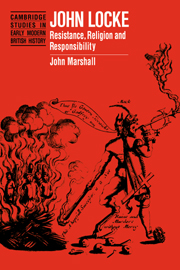Book contents
- Frontmatter
- Contents
- Acknowledgements
- List of abbreviations
- Introduction: Locke's intellectual development
- PART I RELIGION AND THE POLITICS OF TOLERATION
- 1 Against the ‘tyranny of a religious rage’
- 2 Restoration churchmanship and the ‘Essay on Toleration’
- 3 Undermining the temple of worship of priest and prince
- 4 The theology of a reasonable man 1667–83
- PART II RESISTANCE AND RESPONSIBILITY
- PART III HERESY, PRIESTCRAFT AND TOLERATION; JOHN LOCKE AGAINST THE ‘EMPIRE OF DARKNESS’
- Conclusion
- Bibliography
- Index
- Cambridge Studies in Early Modern British History
3 - Undermining the temple of worship of priest and prince
Published online by Cambridge University Press: 07 January 2010
- Frontmatter
- Contents
- Acknowledgements
- List of abbreviations
- Introduction: Locke's intellectual development
- PART I RELIGION AND THE POLITICS OF TOLERATION
- 1 Against the ‘tyranny of a religious rage’
- 2 Restoration churchmanship and the ‘Essay on Toleration’
- 3 Undermining the temple of worship of priest and prince
- 4 The theology of a reasonable man 1667–83
- PART II RESISTANCE AND RESPONSIBILITY
- PART III HERESY, PRIESTCRAFT AND TOLERATION; JOHN LOCKE AGAINST THE ‘EMPIRE OF DARKNESS’
- Conclusion
- Bibliography
- Index
- Cambridge Studies in Early Modern British History
Summary
Locke reiterated many times between 1667 and 1674 as an adviser to Ashley when he was a leading minister of Charles II both the commitments to toleration through indulgence and comprehension and the opposition to Anglican and nonconformist intolerance of the fourth draft of the ‘Essay on Toleration’. These were combined with the anticatholicism, anticlericalism, personal lay Anglicanism and support for nonresistance to which he had been committed as early as the Two Tracts. He maintained these commitments when Ashley became a leading political opponent of Charles' early moves towards absolutism from 1675 to 1681 and when in 1675–8 he saw at first hand increasing French intolerance, to him a particularly onerous symptom of the generally horrifying character of French absolutism. From 1675, in opposing an oath declaring that it was unlawful upon any pretence to take up arms against the King, he very importantly helped to construct, or at least to transcribe, an argument that English monarchy was bounded, and that the fear of ‘breaking the golden chain and contexture between’ King and people was useful to making sure that the King maintained the interest that the people ‘justly and rightly’ claimed. In tandem with that argument, however, it was declared that to take up arms against the King himself was treason, and that any who invaded the King's person or right invaded ‘his whole people’ who derived from him all ‘liberty, property, and safety’.
- Type
- Chapter
- Information
- John LockeResistance, Religion and Responsibility, pp. 73 - 118Publisher: Cambridge University PressPrint publication year: 1994



